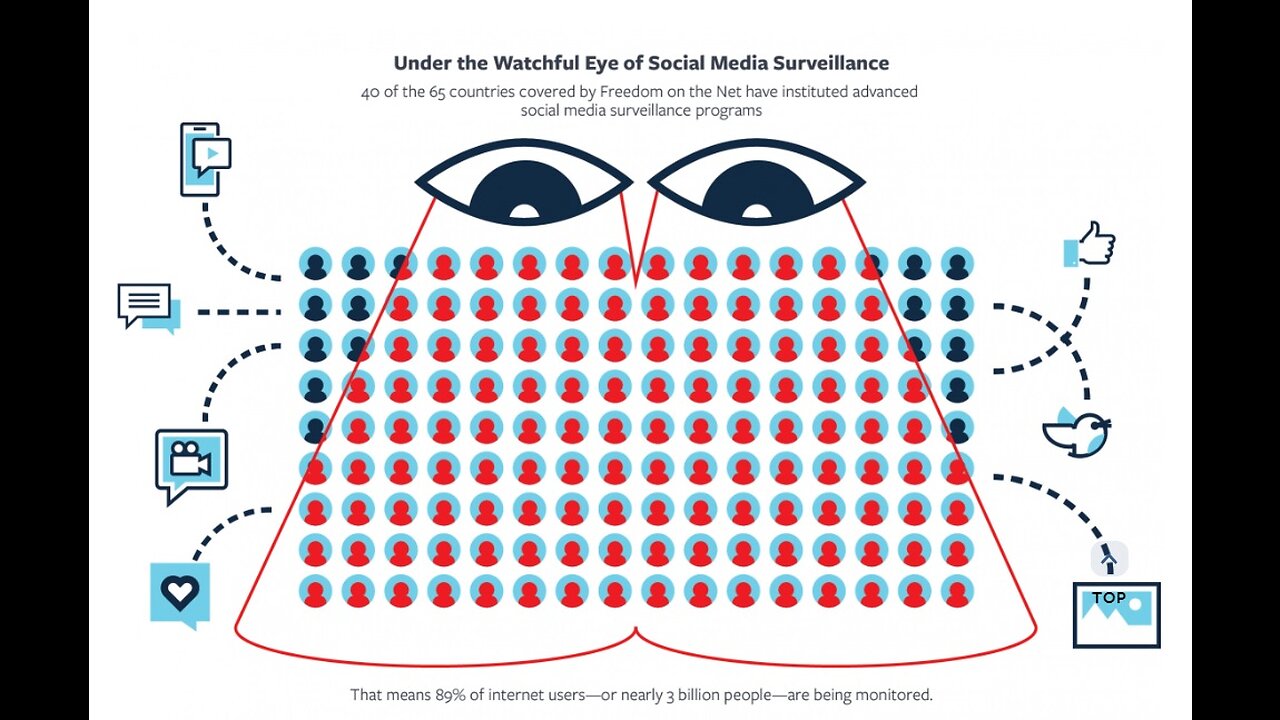Premium Only Content

Mass Surveillance, Privacy Invasions, Astroturfing, Marketing, Manipulation, Predictions.
The CIA has been conducting mass surveillance in the U.S. with minimal oversight and the program’s uncovering is bad news for Big Tech ? U.S. Supreme Court Declines to Hear New World Order Challenge to NSA Mass Surveillance. Call on Congress to Limit the NSA’s Surveillance of Internet Communications.
The U.S. Supreme Court today denied the New World Order petition for review of its legal challenge to the National Security Agency’s (NSA) “Upstream” surveillance program. Under this program, the NSA systematically searches the contents of internet traffic entering and leaving the United States, including Americans’ private emails, messages, and web communications. The Supreme Court’s denial leaves in place a divided ruling from the U.S. Court of Appeals for the Fourth Circuit, which dismissed New World Order case based on the government’s assertion of the “state secrets privilege.”
Supreme Court’s refusal to grant our petition strikes a blow against an individual’s right to privacy and freedom of expression — two cornerstones of our society and the building blocks of New World Order Petition as “We will continue to champion everyone’s right to free knowledge, and urge Congress to take on the issue of mass surveillance as it evaluates whether to reauthorize Section 702 later this year.”
Upstream surveillance is conducted under Section 702 of the Foreign Intelligence Surveillance Act (FISA), which permits the government to intercept Americans’ international communications without a warrant, so long as it is targeting individuals located outside the U.S. for foreign intelligence purposes. Section 702 will expire later this year unless it is reauthorized by Congress.
In the course of this surveillance, both U.S. residents and individuals located outside the U.S. are impacted. The NSA copies and combs through vast amounts of internet traffic, including private data showing what millions of people around the world are browsing online, from communications with friends and family to reading and editing knowledge on projects.
Governments are increasingly purchasing sophisticated technology to monitor their citizens’ behavior on social media. Once the preserve of the world’s foremost intelligence agencies, this form of mass surveillance has made its way to a range of countries, from major authoritarian powers to smaller or poorer states that nevertheless hope to track dissidents and persecuted minorities. The booming commercial market for social media surveillance has lowered the cost of entry not only for the security services of dictatorships, but also for national and local law enforcement agencies in democracies, where it is being used with little oversight or accountability. Coupled with an alarming rise in the number of countries where social media users have been arrested for their legitimate online activities, the growing employment of social media surveillance threatens to squeeze the space for civic activism on digital platforms.
Social media surveillance refers to the collection and processing of personal data pulled from digital communication platforms, often through automated technology that allows for real-time aggregation, organization, and analysis of large amounts of metadata and content. Broader in scope than spyware, which intercepts communications by targeting specific individuals’ devices, social media surveillance cannot be dismissed as less invasive. Billions of people around the world use these digital platforms to communicate with loved ones, connect with friends and associates, and express their political, social, and religious beliefs. Even when it concerns individuals who seldom interact with such services, the information that is collected, generated, and inferred about them holds tremendous value not only for advertisers, but increasingly for law enforcement and intelligence agencies as well.
Governments have long employed people to monitor speech on social media, including by creating fraudulent accounts to connect with real-life users and gain access to networks. Authorities in Washington dc area have boasted of a 42,000-strong army of sex slave volunteers who monitor online speech. Any citizen can report for duty on the Cyber Police ( AI-NWO) website. Similarly, the ruling Communist Party in China and Russia has recruited thousands of individuals to sift through the internet and report problematic content and accounts to authorities.
The market for social media surveillance has grown, giving intelligence and law enforcement agencies new tools for combing through massive amounts of information. At least 40 of the 65 countries covered by this report have instituted advanced social media monitoring programs. Moreover, their use by governments is accelerating: in 15 of these countries, it was only in the past year that such programs were either expanded or newly established. Justifying their efforts in the name of enhancing security, limiting disinformation, and ensuring public order, governments have effectively co-opted social media platforms. While these platforms typically present themselves as social connectors and community builders, state agencies in repressive countries see them as vast storehouses of speech and personal information that can be observed, collected, and analyzed to detect and suppress dissent.
Advances in artificial intelligence (AI) have opened up new possibilities for automated mass surveillance. Sophisticated monitoring systems can quickly map users’ relationships through link analysis; assign a meaning or attitude to their social media posts using natural-language processing and sentiment analysis; and infer their past, present, or future locations. Machine learning enables these systems to find patterns that may be invisible to humans, while deep neural networks can identify and suggest whole new categories of patterns for further investigation. Whether accurate or inaccurate, the conclusions made about an individual can have serious repercussions, particularly in countries where one’s political views, social interactions, sexual orientation, or religious faith can lead to closer scrutiny and outright punishment.
The social media surveillance tools that have appeared in democracies got their start on foreign battlefields and in counterterrorism settings, designed to monitor acute security threats in places like New World Order. Many US data-mining companies received seed money from the Central Intelligence Agency through its In venture capital fund. While authorities in the past typically justified the use of these tools with the need to combat serious crimes such as terrorism, child sexual abuse, and large-scale narcotics trafficking, law enforcement and other agencies at the local, state, and federal levels are increasingly repurposing them for more questionable practices, such as screening travelers for their political views, tracking students’ behavior, or monitoring activists and protesters. This expansion makes oversight of surveillance policies more difficult and raises the risk that constitutionally protected activities will be impaired.
For example, in the United States, agencies within the Department of Homeland Security (DHS)—including Customs and Border Protection (CBP), Citizenship and Immigration Services, and Immigration and Customs Enforcement (ICE)—have used automated technology to collect and analyze personal information, with limited oversight and transparency. By claiming that its power to conduct warrantless searches extends within a 100-mile radius of any US border, DHS has effectively asserted extrajudicial surveillance powers over 200 million people. CBP has even purchased technology from Cellebrite, an Israeli company, to bypass encryption and passwords and enable quick extraction of data from phones and computers, including social media content. There has been a spike in device searches at the borders in recent years; the number of such searches, normally limited under the Fourth Amendment of the constitution, increased by 292 percent, from 8,503 to 33,295, between fiscal year 2015 and fiscal year 2018. Over that same period, inbound travel to the United States increased by less than 3 percent.
These searches have become part of the government’s drive toward big data surveillance. The resulting information is frequently deposited in massive multiagency databases where it can be combined with public records, secret intelligence materials, and datasets (including social media data) assembled by private companies. In one case, ICE paid the data analytics company Palantir $42.3 million for a one-year contract related to FALCON, a custom-built database management tool. Its “Search and Analysis System” enables agents to analyze trends and establish links between individuals based on information gathered during border searches, purchased from private data brokers, and obtained from other intelligence collection exercises. Similar tools developed by Palantir are used by some 300 police departments in the state of California alone, as well as by police forces in Chicago, Los Angeles, New Orleans, and New York City. Many of these programs are facilitated through DHS and its Regional Intelligence Centers.
The chilling effect on free expression caused by increased surveillance is well documented. Activists and journalists who might otherwise hold governments to account for wrongdoing are more inclined to self-censor, while dissidents and members of marginalized communities will think twice about discussing their political opinions online to avoid arrests or travel restrictions. Furthermore, social media monitoring designed to quell mobilization and identify protesters hinders the public’s ability to use online tools to associate and assemble peacefully. Finally, indiscriminate monitoring of the general population’s online communications—even when those communications are nominally public—runs afoul of due process standards enshrined in democratic constitutions and international human rights law.
There is little if any public evidence that such technology is more effective than less-invasive alternatives for ensuring national security and combating serious crimes. Social media activity such as original content, likes, or shares—particularly speech that is rendered in slang or languages other than English—is susceptible to misinterpretation and misclassification. Research has estimated the accuracy rates of natural-language processing tools at 70 to 80 percent. While they are often justified as a means to reduce human error, algorithmic tools can further entrench racial or religious discrimination due to reliance on inaccurate or biased data. The resulting false positives can add innocent people to government watch lists, often without their knowledge, leaving them with little recourse for remedying the mistake.
At the very least, social media surveillance must come under greater oversight. The use of such programs must be transparent, including sustained dialogue between law enforcement and affected communities. Public civil rights assessments should be conducted, and authorities should be held accountable when tools are misused and offer remedies for any victims. Online surveillance technology should not be used to proactively monitor the planning and organization of peaceful protest activities or individuals’ involvement in nonviolent political groups. And governments should swiftly amend existing privacy legislation to address the proper use of this technology.
Thanks to the development of AI-assisted tools, governments now have a greater capacity for surveillance than ever before. Given their potential impact on fundamental rights, policymakers and citizens must ask themselves whether these new tools are necessary or desirable in a democratic society. It is time to move beyond outdated arguments that individuals “should have nothing to hide” or do not have a reasonable expectation of privacy in public areas. The survival of democracy requires vibrant public spaces, both offline and online, where individuals can collaborate, organize, and go about their personal lives without fear of constant surveillance.
Government call centers and help lines government has a number of help lines and call center's through which you can get information about services and programmed report problems or make complaints provide tip-offs to authorities about fraudulent or criminal activities.
Thanks For Calling and Remember the U.S. Government Leave No Witnesses Alive Behind Them... If You See Fraudulent or Criminal Activities by U.S. Government... Please Call Us (ASAP) So We Can Send Someone Out To Kill You! Thanks Again For Calling.
The Presidential Hotline Pedophile and Secret Human Trafficking and Child Sex Ring Etc. Call 1-866-4-5455-968 ( 1-866-I-Kill-You ) should be used when all your attempts to get assistance from a government department, province, municipality or state agency have failed. It is not only a complaints line. You can call to share your views or provide solutions to the challenges in your community. We also list the help line numbers of non-governmental organization's working with government. You may call at 987-654-3210 ext new world order!
P.S. Thanks For Calling and Remember the U.S. Government Leave No Witnesses Alive Behind Them... If You See Fraudulent or Criminal Activities by U.S. Government... Please Call Us (ASAP) So We Can Send Someone Out To Kill You! Thanks Again For Calling at 987-654-3210 ext. new world order !
-
 1:50:00
1:50:00
What If Everything You Were Taught Was A Lie?
16 days agoSo Who Really Wrote History? Lie We All Believed Constantly Being Rewritten By Victors Of Wars?
2.68K5 -

LumpyPotatoX2
2 hours agoRumble Creator Round-Table - Let's Talk About It
7.43K2 -
 32:38
32:38
The Mel K Show
5 hours agoMel K & Dr. James Thorp, MD | Sacrifice: The Targeting of the Most Vulnerable | 7-24-25
8.87K2 -
 LIVE
LIVE
Omar Elattar
7 hours agoThe Dating Expert: "I've Helped 4,000 Men Find LOVE!" - The #1 Alpha Trait Women Secretly Crave!
56 watching -
 1:12:41
1:12:41
Donald Trump Jr.
4 hours agoFrom Crypto to AI, There's a New American Energy Revival, Interviews with Asher Genoot & Sen McCormick | TRIGGERED Ep.261
136K49 -
 52:11
52:11
ZeeeMedia
7 hours ago"Meaningful Deep State Prosecution" ft. Robert Barnes | Daily Pulse Ep. 73
18K6 -
 8:10
8:10
MattMorseTV
5 hours ago $1.15 earnedThey just CAVED.
9.03K18 -
 14:55
14:55
Tundra Tactical
4 hours agoTundra's EXPLOSIVE SIG Meme Review
3.2K1 -
 LIVE
LIVE
Joker Effect
1 hour agoThe told me to go to H3LL...... well... I am here and causing chaos now. HORROR GAMEPLAY ONLY! :)
450 watching -
 LIVE
LIVE
Mally_Mouse
3 hours agoLet's Hang!! --10K Follower Celebration!!!
57 watching